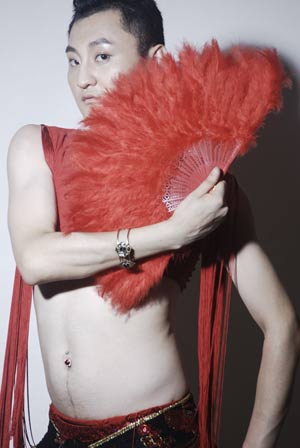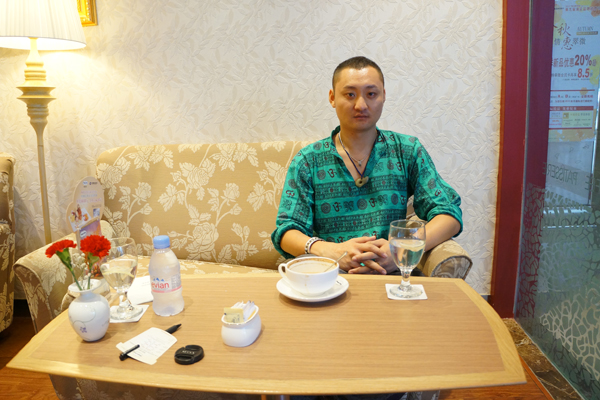Male belly dancer challenges social bias
- By Wu Jin
 0 Comment(s)
0 Comment(s) Print
Print E-mail China.org.cn, September 24, 2013
E-mail China.org.cn, September 24, 2013
|
|
|
Yan Chenbin challenges the social bias to be a belly dancer. [China.org.cn] |
A zigzag woolen coat, a green T-shirt and a pair of loose grey trousers reveal Yan Chenbin's passion for beauty.
Besides his chic attire, he wears a silver necklace, a jade pendant, several bracelets and a ring with a yellow stone in the middle. But his fashionable look is only the tip of the iceberg.
"I love the costumes, the actions and the expression of the dance, which makes you feel pretty and confident," Yan said.
Born in Inner Mongolia Autonomous Region, known for its singing and dancing, Yan was a dancing aficionado when he was young, but he did not get into dance until he was 24 years old. He started by mimicking belly dancing at a friend's home and was praised for his powerful expressiveness.
Encouraged by the compliment, Yan found himself falling in love with the feminine dance, which taught him about women’s complicated inner feelings.
"You need to feel their happiness and bitterness and the ultimate goal is to express those feelings," Yan said.
Yan's peers thought he was very unusual when he first appeared in the belly dancing classroom. Unlike his female classmates, he was always the focus of gossip, and people leaned against the classroom window to jeer at his each move.
But in spite of the mockery and sneering, Yan made a bold decision. He resigned from his job in real estate and started his new career as a professional belly dancer.
"I started learning the dance when I was 24, which was about the time when belly dancing was introduced into China. At that time only a few people knew about it, and even fewer men were learning the dance," Yan said.
Several Arabic dances, including, Raqs Sharqi, Shaabi, Baladi, Saidi and Khaligi, have been introduced into China in recent years. Despite the masculinity of the Saidi dance, Yan chose to learn Raqs Sharqi or belly dancing to demonstrate his unique enthusiasm.
Yan’s decision was first met with strong opposition from his parents, who are traditional Chinese intellectuals.
 |
|
Yan Chenbin [file photo] |
Yan is now working as a belly dance teacher, making a living by teaching classes at several gyms.
He has also won awards in dancing contests, which has convinced his parents that he is capable of persisting in the path he chose.
"Now my parents understand me. In any case, they have learned to respect my choice," Yan said.
But Yan's choice remains hugely controversial in Chinese society. When he was interviewed by China Central Television, several hosts questioned why he would choose a women’s artistic career.
"I don’t think that art has international boundaries, or boundaries between men and women," he argued.
"Take the role of Dan in Peking Opera for example, in which a man performs the female character."
A rising star in dancing contests, TV programs and on Youku, a popular online video website in China, Yan said he won’t be satisfied with his achievements.
"Life is a long process of pursuing dreams. When I have achieved one goal, there is another waiting for me."
Yan is now considering improving his dancing skills by infusing Arabic dance with Chinese elements and finding partners to establish a team of his own.
"I am a cautious man, I won't make a decision if I'm not ready," Yan said.






